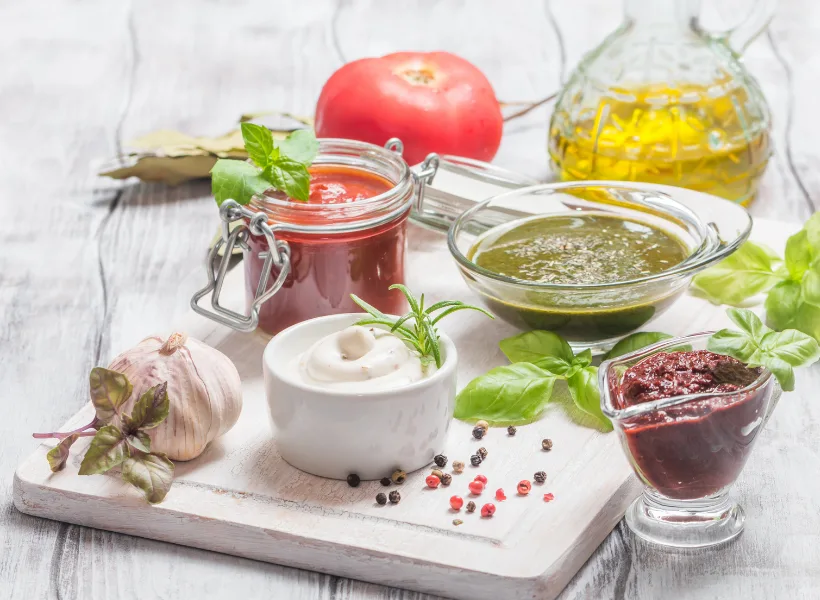Ketchup is one of those go-to condiments that almost everyone loves. It’s sweet, tangy, and pairs perfectly with so many dishes. But what most people don’t realize is how much sugar is hiding in that tasty red sauce. Believe it or not, just one tablespoon of ketchup can pack nearly a full teaspoon of sugar. That might not sound like much, but when you consider that adults are only supposed to have around 21 grams of sugar a day, it adds up fast.
The problem with many store-bought ketchups is that they rely on high fructose corn syrup (HFCS) as their main sweetener. HFCS is a processed sugar that’s been linked to all sorts of health issues like weight gain, diabetes, and even heart disease. So, while it may seem like you’re just adding a little bit of tomato goodness to your meal, you’re actually getting a lot of unnecessary sugar.
And let’s face it—most people don’t stop at just one tablespoon. Ketchup is often piled on generously, especially with popular foods like fries and burgers. Every extra squeeze means more sugar, which can sneakily push your intake way past what’s healthy.
What’s Really Inside Your Ketchup Bottle?
At first glance, ketchup seems like a simple blend of tomatoes, vinegar, and spices. But what you might not realize is that many commercial ketchup brands add extra ingredients that make this common condiment less healthy than it should be. While the base ingredients—like tomatoes and vinegar—are relatively harmless, it’s the hidden additives that cause concern.
One of the biggest culprits? High fructose corn syrup. This processed sweetener is not just bad for your waistline; it’s been linked to a range of health problems, including cardiovascular issues and insulin resistance. Even brands that swap out HFCS for regular sugar or cane sugar don’t really solve the problem, as the sugar content is still incredibly high.
Another issue is the sodium. Most ketchup brands load their products with salt to boost the flavor, which can contribute to high blood pressure over time if consumed regularly. Combine that with the sugar, and what you’re left with is a condiment that’s far from the healthy, tomato-based sauce it pretends to be.
The bottom line? Ketchup isn’t as innocent as it looks, especially when it’s coming from a bottle off the grocery store shelf. But don’t worry, there are better options—and we’ll get into that next!
A Healthier, Homemade Alternative to Ketchup
The great thing is, you don’t have to ditch ketchup completely to make healthier choices. It’s actually super easy to make your own ketchup at home, and the best part? You get to control what goes in it—no hidden sugars or unnecessary additives.
Homemade ketchup isn’t just better for you, it can taste even better too. With ingredients like sun-dried tomatoes and apple cider vinegar, you get that classic ketchup flavor without all the extra junk.
And don’t worry—this recipe is quick and simple. Plus, you can adjust it to suit your taste, whether you prefer it sweeter or a bit more tangy.
Homemade Ketchup Recipe You’ll Love
Ready to give homemade ketchup a try? This recipe is super simple and uses wholesome ingredients that you probably already have in your kitchen. Plus, it’s customizable, so you can adjust it to your liking—whether you prefer a little more sweetness or a stronger vinegar kick.
Ingredients:
- ½-1 cup sun-dried tomatoes (soaked for 2 hours)
- ¼ cup apple cider vinegar
- ¼ cup raisins
- ¼ teaspoon onion powder
- 1 tablespoon sea salt
- Water, as needed for blending
Directions:
- Start by combining the soaked sun-dried tomatoes, apple cider vinegar, raisins, onion powder, and sea salt in a blender.
- Blend on high, adding water as needed to get a smooth, creamy texture.
- Once it’s blended to your liking, serve it right away or store it in the fridge for later use.
This homemade version not only tastes amazing but also leaves you feeling good about what you’re putting on your plate.
Why Homemade Ketchup Is a Healthier Choice
Making your own ketchup isn’t just about avoiding extra sugar—it’s about choosing real ingredients that are way better for your health. Store-bought ketchup often sneaks in processed sugars like high fructose corn syrup, along with preservatives and other unnecessary additives.
When you whip up your own ketchup at home, you’re using simple, whole ingredients like sun-dried tomatoes, apple cider vinegar, and raisins. These bring natural sweetness and flavor, while also adding some extra benefits. For instance, tomatoes are packed with lycopene, a powerful antioxidant that’s good for your heart. Apple cider vinegar not only gives your ketchup that perfect tang but can also help with digestion and blood sugar control.
The best part? You get to customize it. Want less salt? Easy. Like a little more kick or sweetness? You’re in charge, so you can adjust it to fit your taste and health needs.
Homemade ketchup isn’t just tastier, it’s a smarter choice for your body.
A Delicious, Healthier Alternative You Can Feel Good About

In the end, ketchup doesn’t have to be something you cut out of your life just because it’s loaded with sugar. By making your own, you can still enjoy all the tangy, sweet goodness without the guilt. Plus, with the ability to customize the ingredients, you’re in full control of how healthy and flavorful your ketchup turns out. It’s a small, simple change that can have a big impact on your health, and the difference in taste is undeniable.
Whether you’re dipping fries, spreading it on a burger, or using it as a base for sauces, this homemade version will quickly become a kitchen staple. And the best part? You’ll know exactly what’s in it, without the hidden sugars or preservatives that often sneak into store-bought versions. It’s a win for your taste buds and a win for your overall wellness.
So, why not give homemade ketchup a try? Once you taste how fresh and flavorful it is, you might never go back to the store-bought stuff again. Your health will thank you, and so will everyone else at the dinner table!




